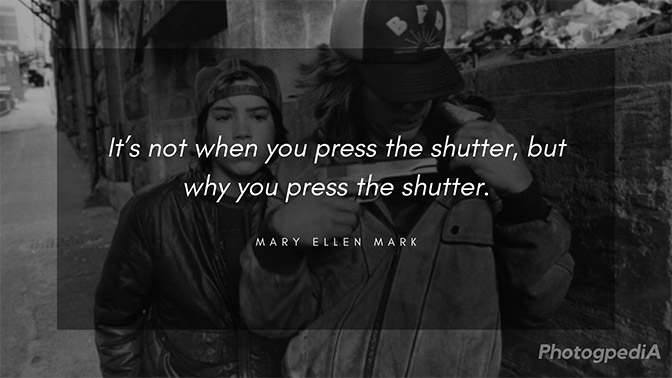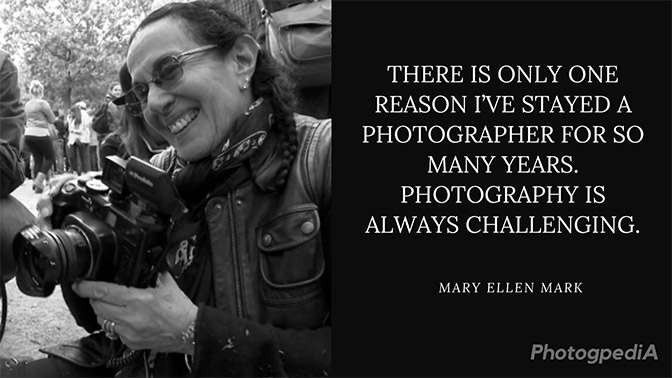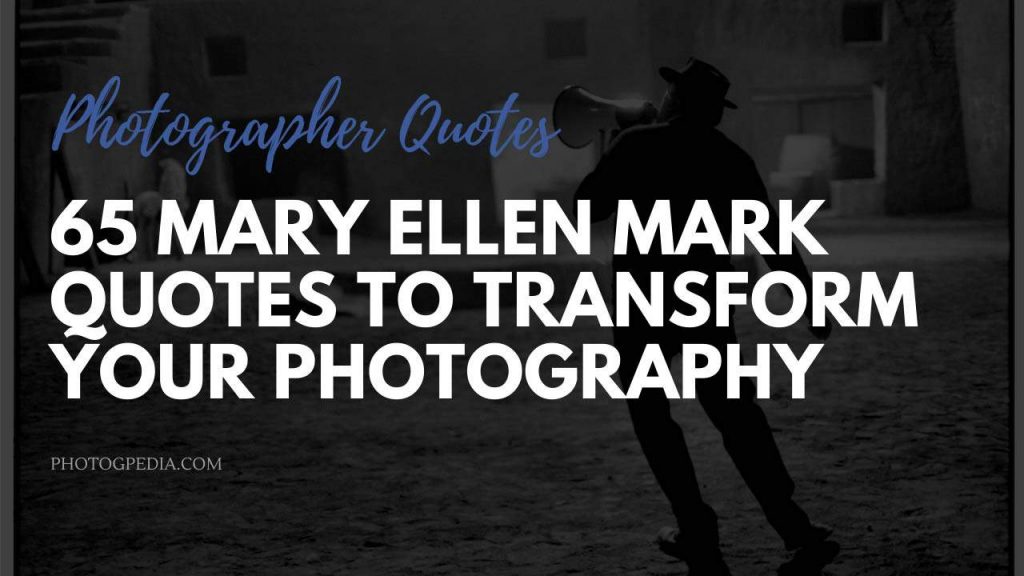Looking for the best Mary Ellen Mark quotes? You’ve come to the right place. Not only was Mary Ellen a remarkable photographer, she was also a wonderful teacher.
Below you’ll find 65 of Mark’s best quotes to inspire you and help take your photography to the next level.
If you haven’t done so already, we recommend reading our Mary Ellen Mark master profile article to learn more about her photography work, techniques, cameras and much more.
Mary Ellen Mark Quotes
A great photograph needs no explanation; it functions by suggestion. There is no need to be explicit.
I think photography is closest to writing, not painting. It’s closest to writing because you are using this machine to convey an idea. The image shouldn’t need a caption; it should already convey an idea.
Life is really very sad or it’s very funny. My images are like that – sad, funny and satirical.
What I’m trying to do is make photographs that are universally understood… that cross-cultural lines. I want my photographs to be about the basic emotions and feelings that we all experience.
I really believe in pictures that have content. That’s where my heart and soul is.
[When photographing I want to reach and touch] something that I feel is at the core of people.
I don’t think you can develop or learn a way of seeing or a point of view. A way of seeing is who you are, how you think and how you create images. It is something that is inside of you. It’s how you look at the world.
Photograph the world as it is. Nothing’s more interesting than reality.
I always felt that you’re never as good, until the next thing you do. That you can never feel like you’ve made it, that you’re there, but I think you should always strive to be better and to stick to who you are, it’s really important you stick to who you are.
It’s not when you press the shutter, but why you press the shutter.

Documentary and Photojournalism Quotes
I’m a documentary photographer. That’s what I’ve always wanted to be; that’s where my heart and soul is.
I go into every story thinking I’m going to fail. I think about that all the time. I think it’s going to be terrible. Every story is like the first I’ve ever done.
Reality is so bizarre, you could never think of those ideas. Fiction writers are great in the sense that they can imagine. I could never ‘imagine’ things. What I’m really great at is looking – that’s my forte – to be able to pull things from reality, to see what’s strange and real.
I worry with every project that I’m going to fail, and when it starts to go well, and I sense that something beautiful and important and meaningful is being created, it’s a fantastic feeling.
I don’t expect to change the world with my photographs, I just want to make pictures that have substance.
What’s more frustrating than magazines giving less and less space is that they tell you what they want. Not LIFE, but some magazines actually want you to be an illustrator, and I don’t want to be an illustrator — I don’t enjoy those assignments. You know, I want to have a change to be a real part of the creative process and not just a technician who clicks the camera.
I belong to a bygone era when magazines sent you out to do a thorough report. It was a more traditional kind of photography reflecting a world that didn’t want images of it to be perfect. We don’t look at the truth anymore; instead, we look at whatever reassures us.
Doing long documentary projects is harder and harder because it’s not really supported in magazines as much anymore. You have to make time for personal projects. Portraiture is kind of an extension of my documentary work.
I think you have to have a real point of view that’s your own. You have to tell it your way. And, I think that it’s a mistake to shoot for a specific magazine’s point of view because it’s never going to be as good. You have to shoot for yourself and photograph [ the way] you believe it.
The best advice I can give to young documentary photographers who are starting their careers is to never lose sight of their goals and to follow their hearts.
Finding Projects and Subjects
Finding the right subject is the hardest part.
I’m just interested in people on the edges. I feel an affinity for people who haven’t had the best breaks in society. I’m always on their side. I find them more human, maybe. What I want to do more than anything is to acknowledge their existence.
The obsessions we have are pretty much the same our whole lives. Mine are people, the human condition, life.
I want my photographs not only to be real but to portray the essence of my subjects also. In order to do that, you have to be patient.
What you look for is a symbol of something in everyone’s life.
I just wanted to do photographs that I believed in without having any rhyme or reason or theory or having to spell out a sort of storytelling. I wanted to show their personalities – that was the thing that drew me to them.
Usually my ideas for work have revolved around my interest in people, especially people that live on the edges of society.
I’m interested in reality, and I’m interested in survival. I’m interested in people who aren’t the lucky ones, who maybe have a tougher time surviving, and telling their story.
I would die if I had to be confined. I don’t want to feel that I’m missing out on experiencing as much as I can. For me, experiencing is knowing people all over the world and being able to photograph.
I’m trying to please myself; certainly that’s a big criterion… though in a sense, I don’t take images just for myself. I take images that I think other people will want to see. I don’t take pictures to put in a box and hide them. I want as many people to see them as possible.
I think you reveal yourself by what you choose to photograph, but I prefer photographs that tell more about the subject. There’s nothing much interesting to tell about me; what’s interesting is the person I’m photographing, and that’s what I try to show.
Mary Ellen Quotes on Photographing People
I just think it’s important to be direct and honest with people about why you’re photographing them and what you’re doing. After all, you are taking some of their soul.
Everyone asks me how I get my subjects to open up to me. There’s no formula to it. It’s just a matter of who you are and how you talk to people – of being yourself. Your subjects will trust you only if you’re confident about what you’re doing. They can sense that immediately.
There are some people who become best friends with everyone they photograph. There are people that I really like and admire and respect, but in a way I think it’s better to keep a distance. I think you get better pictures of people that you don’t know very well.
It’s just a matter of who you are and how you talk to people. Your subjects will trust you only if you’re confident about what you’re doing. It really bothers me when photographers first approach a subject without a camera, try to establish a personal relationship, and only then get out their cameras. It’s deceptive. I think you should just show up with a camera, to make your intentions clear. People will either accept you or they won’t.
I think each photographer has a point of view and a way of looking at the world… that has to do with your subject matter and how you choose to present it. What’s interesting is letting people tell you about themselves in the picture.
The subject gives you the best idea of how to make a photograph. So I just wait for something to happen.
Portrait Photography Quotes
To touch on people’s lives [in a way they] haven’t been touched on before, it´s fascianting. You know, it’s one thing if [a celebrity] has an incredible character and you’re really going to be able to delve into their personality – that’s great. But you can never get real purity if people have been spoiled by the camera and don’t trust you. I like feeling that I’m able to be a voice for those people who aren’t famous, the people that don’t have the great opportunities.
With celebrity images they often work just because it is a famous face, and it is nothing more. I want to do more. The thing with making a celebrity image is to get beyond the celebrity.
In a portrait, you always leave part of yourself behind.
Mary Ellen Mark on Photography Technique
I don’t crop my photographs. I consider the entire frame while I’m shooting. It’s a discipline I learned when I began to photograph.
If the background doesn’t work together with your main subject, you won’t have a good picture.
Photographs can be enigmatic. They sometimes work because of what is included in the frame; and sometimes because of what is not. There’s no formula… It’s a mysterious process, an endless challenge.
Photographers must have a point of view, [they] must have something to say. Without a philosophy, a photographer is simply a technician who clicks the camera.
I don’t think you’re ever an objective observer. By making a frame you’re being selective, then you edit the pictures you want published and you’re being selective again. You develop a point of view that you want to express. You try to go into a situation with an open mind, but then you form an opinion and you express it in your photographs. It is very important for a photographer to have a point of view – that contributes to a great photograph.
I prefer not to think ahead about what I’m going to say with my photographs. I would rather be surprised and see what my subjects bring to the photograph.
People often ask me what makes a great image. That’s an almost impossible question to answer. Sometimes the obvious can make a great image. Sometimes a photograph works because of its subtlety or what is excluded from the frame. For me, a great image involves a combination of strong content and excellent design.
I tell my students, don’t look at the back of your camera, turn it off. Because you never know, you think you have it then you walk away and you’ve missed your picture. Whether you have it or not, should come from your head, not from what you see on a tiny image on the back of the camera.
A good print is really essential. I want to take strong documentary photographs that are as good technically as any of the best technical photographs, and as creative as any of the best fine-art photographs. [That is doubly important because] I don’t want to just be a photo essayist; I’m more interested in single images…. once that I feel are good enough to stand on their own.
Mary Ellen Quotes on Film Photography
I’m staying with film, and with silver prints and no Photoshop… [that’s] the way I learned photography. You make your picture in the camera.
That’s the way I learned photography: You make your picture in the camera. Now, so much is made in the computer. I’m not anti-digital, I just think, for me, film works better.
I’m not against digital photography. It’s great for newspapers. And there are photographers doing great work digitally. When they use Photoshop as a darkroom tool, that’s fine, too. But at this point of my life, after so many years, I don’t really want to change, and I still love film.
I’m kind of a purist that loves reality – and that’s not the trend now. Now they want very commercial, very decorated illustrations.
Learning how to use different formats has made me a better photographer. When I started working in medium format, it made me a better 35 mm photographer. When I started working in 4×5, it made me a better medium-format photographer.
Digital Manipulation
When I started out, it was considered very wrong to change an image. There were scandals if someone inserted a sky into a war picture or something. Now it’s all about that.
I’ve always relied on beautiful lighting, atmosphere and who the person is, not what’s done afterwards.
I respect newspapers but the reality is that magazine “photojournalism” is finished. They want illustrations, Photoshopped pictures of movie stars.
I like the idea of being able to capture a moment in time, a moment of reality, but all that has changed now with people being able to Photoshop images so much. You don’t know what is real any more and what isn’t. But I am an analog photographer and it is about capturing the moment of reality. It hasn’t changed for me: I shoot film and I will continue to shoot film. I think it is more beautiful. It is the reason I became a photographer. I am not an illustrator; a lot of the digital, Photoshopped photography is what I would call illustration, not photography. With that kind of work the post-production guy is probably the most important guy in the process, not the photographer.
Nowadays shots are created in post-production, on computers. It’s not really photography.
Black and White Photography
The difficulty with color is to go beyond the fact that it’s color – to have it be not just a colorful picture but really be a picture about something. It’s difficult. So often color gets caught up in color, and it becomes merly decorative. Some photographers use [ it ] brilliantly to make visual statements combining color and content; otherwise it is empty.
I work in colour sometimes, but I guess the images I most connect to, historically speaking, are in black and white. I see more in black and white – I like the abstraction of it.
The Life of a Photographer
I remember the first time I went out on the street to shoot pictures. I was in down town Philadelphia and I just took a walk and started making contact with people and photographing them, and I thought: ‘I love this. This is what I want to do forever.’ There was never another question.
If I hadn’t become a photographer, I would have loved to become a doctor. I would have loved to have done something that actually helped people and changed their lives.
One of my all-time favorite photographers is Irving Penn. I wish I could have watched him work.
Sometimes I work on film sets. I’ve done this for 40 years. I always wanted to photograph on the set of an Ingmar Bergman film. Unfortunately, I never had the opportunity.
When you’re working on a film [set], it’s almost like photographing paintings at a museum. You’re photographing somebody else’s world. I just try and interpret it and make it real, and make it what the actors are about, what the director is about, and what the film is about.
If you do great pictures it is fine art, no matter what. The galleries manipulate things, the market. If you deliberately set out to be an artist, that is the wrong way to think as a photographer. The work should be great, and that is all that is important. If people want it, and want it to put on their walls, that’s great too.
If you are interested in photography because you love it and are obsessed with it, you must be self-motivated, a perfectionist, and relentless.
There is only one reason I’ve stayed a photographer for so many years. Photography is always challenging.

What’s your Favorite Mary Ellen Mark Quote?
Have a favorite Mary Ellen Mark quote from the list? Let us know in the comment section below.
Don’t forget to bookmark this page, or print it out, and refer to it next time you need some inspiration. Also, don’t forget to share it with others through the usual channels (social media, forums, websites, etc).
To see more of her remarkable work, head over to the Mary Ellen Mark Foundation website.
Looking for more words of wisdom from master photographers? Check out the quotes section of Photogpedia for more great photography quotes.
More Quote Articles:

